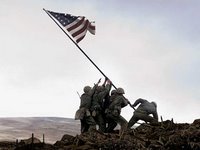Flags of our Fathers
 I went to an early UK preview of Flags of our Fathers today, Clint Eastwood's take on the American capture of Iwo Jima during WW2. It was affecting as war carnage movies must be. Since I'm mid-flow in my own writing project, my own reaction is fuelled by that fact.
I went to an early UK preview of Flags of our Fathers today, Clint Eastwood's take on the American capture of Iwo Jima during WW2. It was affecting as war carnage movies must be. Since I'm mid-flow in my own writing project, my own reaction is fuelled by that fact.So I puzzle at the film's chronology. I can keep pace as it jumps from present-day to wartime, and even darts to and fro among those wartime events, but it was a strain. Odd too to have old actors play aged versions of the young ones .. who was who? We were meant to care for a character called Iggy at the end. Now who on earth was Iggy? I didn't know.
I did a survey of bestselling books some time back, in all genres, and one factor in all of them was straight chronological telling. The distorted version of chronology offered here seems a mistake.
The moral set out at the beginning was not followed through on either. We were told that in war heroes and villains are generally not those we take them to be. Interesting enough ... but there was no follow-through. The film had no villains.
Eastwood's clearly a master of the business though, so it was good to get an object lesson in how to turn a wartime conflict into a matter of domestic relationships - mostly in this instance by portraying the mothers waiting at home. The fears of the womenfolk on shore offered the same sort of thread to the film of The Perfect Storm. I was talking to the Bafta-winning screenwriter Paul Smith last night. He wanted to know about 'the relationships' of my biographical subject, J. S. Haldane. That's clearly a core question for screenwriters, something he searches for in a story. I'm working to bring the women of the story into my book, but the core relationship of JS's life was with his son. I must now make sure that I dramatize that clearly enough. There was a good deal of film interest in the proposal for the book. Now's the chance to put in some of those filmic buzz factors.
Flags of our Fathers was best when it dared to show the physical mutilation of war. I keep reading about it, am writing about gas warfare myself, but somehow seeing it still makes every difference.


0 Comments:
Post a Comment
Links to this post:
Create a Link
<< Home